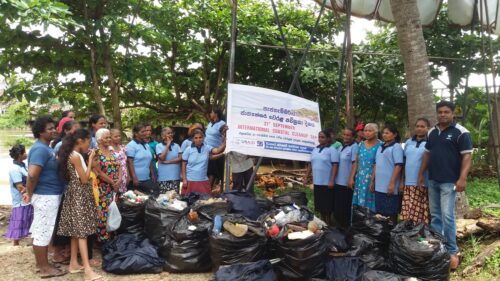USAID Announces New Partnerships in Sri Lanka to Turn the Tide on Ocean Plastics this World Oceans Day

USAID’s programs support new models for reuse, reduction, and recycling that can lessen urban footprints and yield healthier, plastic-free seas. Credit: USAID Urban/Municipal Waste Recycling Program
Island nations face unique challenges in managing waste, with growing populations, rapidly urbanizing coastal areas, and influxes of offshore marine debris that threaten marine resources. Globally, Sri Lanka is estimated to be the fifth-largest source of ocean plastics, and just 1,000 kilometers away its neighbor, the Maldives, is facing many of the same challenges–both burdened with managing a growing amount of waste amidst a finite measure of land and resources.
Awareness, however, is also picking up pace, with national governments, non-governmental organizations, and local communities taking action to reverse the tides of plastic. In celebration of World Oceans Day, U.S. Agency for International Development (USAID) Sri Lanka and Maldives applauds these efforts and is proud to share both new and ongoing efforts and partner with the United States to reduce waste, develop new ways of reusing materials for more circular economies, and increase recycling for healthier cities and seas.
In 2016, USAID launched the Municipal Waste and Recycling Program (MWRP), which partners with grantees across Vietnam, the Philippines, Sri Lanka, and Indonesia to reduce land-based sources of ocean plastic pollution. MWRP has provided a total of over USD $1.2 million in grants to local organizations across Sri Lanka. Program grants and technical assistance have resulted in a range of piloted and proven models for more sustainable, ocean-friendly waste system–ranging from educational school programs to partnerships with local tourism sectors to separate plastics, reduce plastic consumption, and collect recyclable plastic waste.
MWRP’s pilot results have not only reduced ocean-bound plastic waste, but have created a range of additional benefits to make communities stronger, healthier, and more resilient. For example, in 21 villages of the southern district of Galle, the program reduced improperly disposed plastic waste, which resulted in less waste-clogged waterways and contributed to a decline in dengue fever cases (close to 80%) by eliminating breeding grounds for mosquitoes. In Dehiwala, a fast-growing suburb of Colombo, MWRP helped launch five private waste collection microenterprises and provided training to 23 private recyclers that sell recyclable materials, resulting in job creation and increased income. And on the east coast, in Arugam Bay, MWRP’s grantees established a waste segregation system for plastics and created a new identity for Arugam Bay as a green tourist destination on Sri Lanka’s East coast. This Waste Less Arugam Bay (WLAB) initiative not only has resulted in less plastic waste, but also supports tourism and local business. WLAB has established an alternative to purchasing plastic bottled water by setting up centers for visitors to refill their bottles, learn about resources used to create virgin plastic bottles,and experience a first hand small scale recycling process by making a recycled plastic souvenir. To help travelers avoid use of single-use plastic bottles, the WLAB project maintains a website (www.getwater.lk) with locations of free water-refill stations across Sri Lanka. Local businesses in Arugam Bay also receive bins to separate plastic bottles from other waste that is destined for landfill. A daily-collection WLAB vehicle then collects and transports plastic bottles to a project location to be baled and later transported to a synthetic yarn production facility. Here the plastic bottles are turned into 100% recycled plastic polyester yarn. This polyester yarn reduces the need for virgin plastic in polyester production. All together, program efforts have created cleaner and healthier communities for over 840,000 residents in northern, southern, eastern and western regions where MWRP works, and ultimately cleaner oceans worldwide.
MWRP collaborates with local government, private sector, local organizations and communities to implement its activities and achieve progress. At a recent USAID-supported workshop participants agreed that they need each other to succeed. “We cannot do it alone,” one private sector representative stated.
Echoing this sentiment, in the coming months, USAID’s global, flagship program to control ocean plastics–Clean Cities, Blue Ocean (CCBO)–will start work in both Sri Lanka and the Maldives to support local change, backed by global support, to help communities in turning the tide of ocean plastics. CCBO is a five-year global program (2019-2024) that offers state-of-the-art international technical expertise and partners with local organizations to implement sustainable, locally-led solutions through its grants program.
In Sri Lanka, the program will begin working with partners in three engagement sites—the metro Colombo area in western Sri Lanka, Galle in the South, and Jaffna in the North; to identify, test, and scale locally-driven solutions that promote more sustainable 3R practices (reducing, reusing, recycling). The program will also enhance solid waste management systems, and engage national and local government, the private sector, local organizations, and community members to advance the global fight against ocean plastics through local solutions. CCBO will build from and expand on the success of ongoing local government and non-governmental organizations initiatives, including those of USAID MWRP.
Through local solutions such as these, both Sri Lanka and the Maldives can continue to reduce plastic waste and its impacts on our ocean, cities, and communities. CCBO is currently seeking local partners and accepting Grant Concept Papers from organizations that are interested in and qualified to implement locally-led solutions that support the program objectives. The next deadline for applications is July 6, 2020. Visit the CCBO Grants Program website to download the full Annual Program Statement and to learn how interested organizations can apply.

